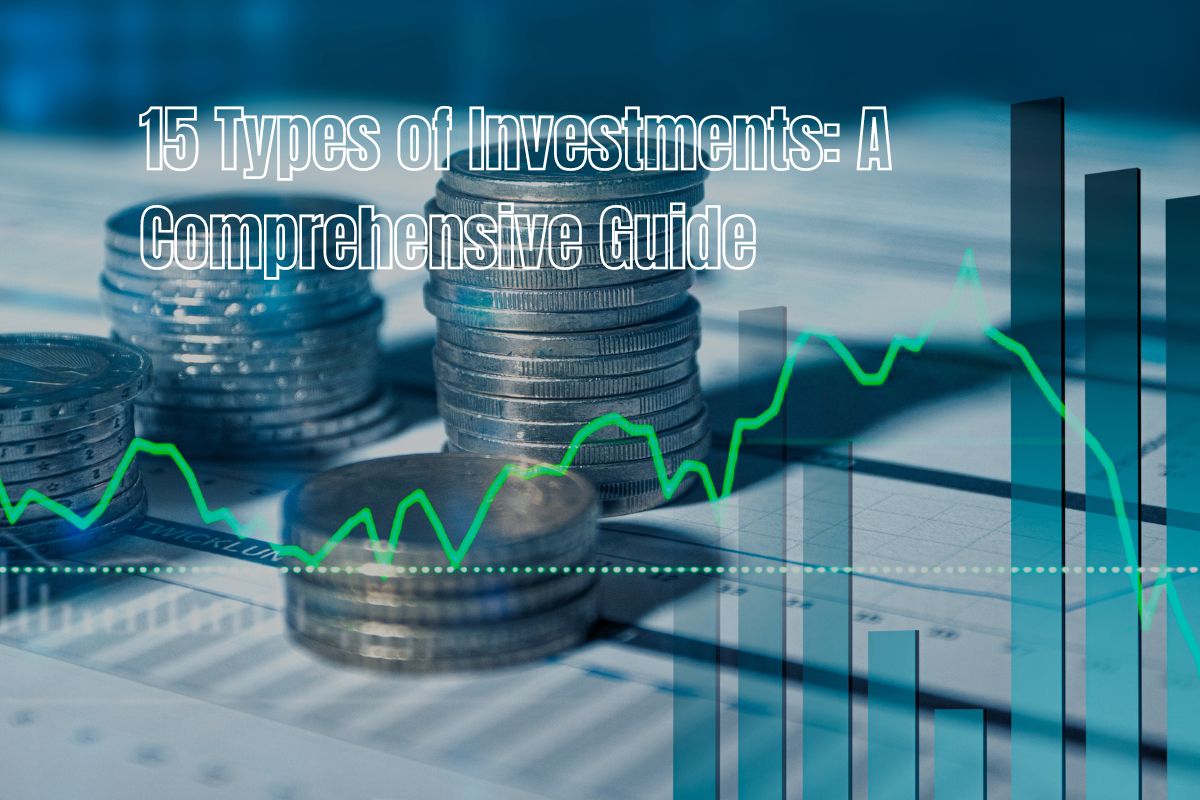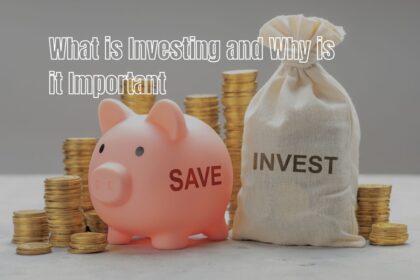Introduction
Investing your money is a crucial step towards securing your financial future. With numerous investment options available, it can be overwhelming to decide where to put your hard-earned money. In this comprehensive guide, we will explore 15 types of investments that can help you grow your wealth and achieve your financial goals. Whether you are a novice investor or someone with experience, this guide will provide valuable insights to help you make informed investment decisions.
What Are the 15 Investment Categories?
The world of investments is vast and offers a multitude of options to grow your wealth. Here are the 15 investment categories that you can explore: stocks, bonds, mutual funds, ETFs, real estate, commodities, cryptocurrencies, options, futures, forex, index funds, retirement accounts, peer-to-peer lending, venture capital, IPO and collectibles. Each category presents unique opportunities and risks, allowing you to diversify your portfolio and tailor your investments to your financial goals and risk tolerance. Whether you’re seeking long-term growth, stable income, or speculative ventures, these investment categories provide a comprehensive range of choices to suit your investment preferences.
15 Types of Investments
While it is possible to categorize investments into main categories, as mentioned earlier, it’s important to note that within these categories, there are numerous types of investments to consider. Here are 15 key types of investments that encompass a wide range of investment options.
Stocks: Owning a Piece of a Company
Investing in stocks means buying shares of a company, which makes you a partial owner. Stocks offer potential long-term growth and the possibility of receiving dividends. However, they also come with risks, as stock prices can be volatile. It’s important to research and analyze the financial health and performance of the companies you are interested in before investing in their stocks.

Bonds: Fixed Income Securities
Bonds are debt instruments issued by governments, municipalities, and corporations to raise capital. When you buy a bond, you are essentially lending money to the issuer in exchange for regular interest payments and the return of the principal amount at maturity. Bonds are considered relatively safer than stocks, as they provide a fixed income stream and are less affected by market fluctuations.
Mutual Funds: Diversified Portfolios for Investors
Mutual funds pool money from multiple investors to invest in a diversified portfolio of stocks, bonds, or other securities. They are managed by professional fund managers who make investment decisions on behalf of the investors. Mutual funds offer an opportunity for small investors to access a diversified portfolio with professional management. They are available in various categories, catering to different investment objectives and risk tolerances.
Also Read: National Pension Scheme (NPS)
ETFs: A Blend of Stocks and Mutual Funds
Exchange-Traded Funds (ETFs) are similar to mutual funds but trade on stock exchanges like individual stocks. They offer the benefits of diversification, flexibility, and low costs. ETFs can track a specific index, sector, or asset class, allowing investors to gain exposure to a wide range of investments. They provide an alternative to traditional mutual funds and can be bought and sold throughout the trading day.
Real Estate: Tangible Property Investments
Investing in real estate involves purchasing properties with the expectation of generating income and/or capital appreciation. Real estate offers the potential for steady cash flow through rental income and long-term value appreciation. It can be a suitable investment for individuals looking for tangible assets and diversification beyond traditional stocks and bonds. Real estate types of Investments can take various forms, including residential properties, commercial buildings, and real estate investment trusts (REITs).
Commodities: Investing in Physical Goods
Commodities are raw materials or primary agricultural products that can be bought and sold, such as oil, gold, corn, or coffee. Investing in commodities can provide a hedge against inflation and diversification benefits. Investors can gain exposure to commodities through futures contracts, exchange-traded funds (ETFs), or commodity-focused mutual funds. However, commodity types of Investments can be volatile and require a good understanding of the underlying market dynamics.
Cryptocurrencies: The Rise of Digital Assets
Cryptocurrencies, such as Bitcoin and Ethereum, have gained significant popularity in recent years. They are digital assets that use cryptography for security and operate on decentralized networks called blockchains. Cryptocurrencies offer the potential for high returns but also come with high volatility and risks. It’s important to conduct thorough research and understand the technology, market trends, and regulatory landscape before investing in cryptocurrencies.

Options: Derivative Contracts for Risk Management
Options are derivative contracts that give the holder the right, but not the obligation, to buy or sell an underlying asset at a predetermined price within a specified period. They are often used for risk management and hedging strategies. Options can be complex instruments and require a good understanding of the underlying asset and market dynamics. They offer flexibility and leverage but also come with potential risks and losses.
Futures: Contracts for Future Delivery
Futures contracts are agreements to buy or sell an asset at a predetermined price on a specified date in the future. They are commonly used by investors and traders to speculate on price movements or hedge against potential losses. Futures contracts are available for various asset classes, including commodities, currencies, and stock market indices. Trading futures requires a good understanding of the market, as well as careful risk management.
Forex: Trading Currencies in the Global Market
Forex, short for foreign exchange, is the decentralized market where currencies are traded. Forex trading involves buying one currency and selling another simultaneously, with the aim of profiting from changes in exchange rates. It is one of the largest and most liquid financial markets globally. Forex trading can offer opportunities for profit, but it is also highly volatile and carries substantial risks. Traders need to develop a solid trading strategy and risk management plan.
Also Read: Rule of 72
Index Funds: Broad Market Exposure
Index funds are mutual funds or ETFs that aim to replicate the performance of a specific market index, such as the S&P 500. They provide broad market exposure and are designed to match the returns of the underlying index. Index funds are popular among passive investors due to their low costs and potential for consistent returns. They offer diversification across a wide range of stocks or bonds, depending on the index they track.
Retirement Accounts: Types of Investments for the Golden Years
Retirement accounts, such as 401(k)s and Individual Retirement Accounts (IRAs), provide individuals with tax-advantaged options to save and invest for retirement. These accounts offer various investment options, including stocks, bonds, mutual funds, and ETFs. Contributions to retirement accounts may be tax-deductible, and the earnings grow tax-deferred until withdrawal. It’s essential to take advantage of these accounts early on to maximize the benefits of compounding growth.
Peer-to-Peer Lending: Directly Funding Borrowers
Peer-to-peer (P2P) lending platforms connect borrowers directly with individual lenders. By bypassing traditional financial institutions, P2P lending offers the potential for higher returns for lenders and lower interest rates for borrowers. Investors can participate in P2P lending by funding loans to individuals or small businesses. However, it’s important to assess the creditworthiness of borrowers and diversify investments to manage risk effectively.
Venture Capital: Types of Investments in Startup Companies
Venture capital involves investing in early-stage companies with high growth potential. Venture capitalists provide funding and expertise to help these companies succeed. Investments in venture capital are considered high-risk but can offer substantial returns if successful. It requires a deep understanding of the startup ecosystem, market trends, and the ability to identify promising opportunities. Venture capital types of Investments are usually suitable for experienced investors with a higher risk tolerance.

Collectibles: Tangible Assets with Value
Collectibles, such as NFTs rare coins, stamps, artwork, or vintage cars, can be investments that appreciate in value over time. These tangible assets can offer diversification and potential hedging against economic uncertainties. However, investing in collectibles requires expertise and knowledge of the specific market. Factors like condition, rarity, and historical significance greatly influence the value of collectibles.
FAQs (Frequently Asked Questions)
-
Q: Can I invest in multiple types of investments simultaneously?
A: Absolutely! In fact, diversifying your investment portfolio across various asset classes can help mitigate risk and maximize potential returns.
-
Q: Are there any guaranteed investments with no risk?
A: No types of Investments is entirely risk-free. Each investment type carries its own set of risks and rewards. It’s important to carefully evaluate your risk tolerance and investment goals before making any decisions.
-
Q: How can I determine which investment option is right for me?
A: Consider factors such as your personal finance goals, time horizon, risk tolerance, and knowledge of the investment. It’s also advisable to seek guidance from a financial advisor who can provide personalized recommendations.
-
Q: Should I invest on my own or seek professional assistance?
A: It depends on your knowledge, experience, and comfort level. While self-directed investing can save costs, professional advisors can offer valuable insights and expertise to help you make informed types of Investments decisions.
-
Q: Is it necessary to monitor investments regularly?
A: Regular monitoring of your types of Investments is essential to stay updated with market trends and assess the performance of your portfolio. However, it’s also important to strike a balance and avoid making impulsive decisions based on short-term market fluctuations.
-
Q: Can I start investing with a small amount of money?
A: Yes, many types of Investments options allow you to start with a small amount of money. For example, mutual funds, ETFs, and some online platforms offer low minimum investment requirements, making investing accessible to individuals with varying budgets.
Conclusion
Investing is a powerful tool for building wealth and achieving financial goals. By diversifying your types of Investments across various asset classes, you can manage risk and potentially increase your returns. However, it’s crucial to understand the characteristics, risks, and potential rewards of each investment type before committing your money. Take the time to educate yourself, seek professional guidance when needed, and regularly review your investment strategy to ensure it aligns with your evolving financial goals.













